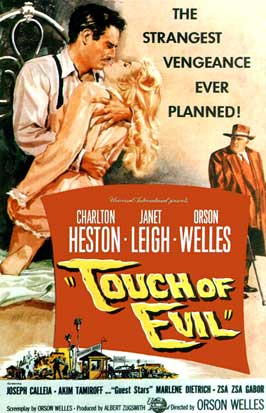
"
This isn't the real Mexico. You know that. All border towns bring out the worst in a country"
Film Noir is always touted as one of film-lovers favourite genres. The deep shadows and sharp light beams that litter the screen provide a moody and classy atmosphere. Ironically, having written a post recently about having an anti-genre preference, here I will be discussing a 'staple' of the Film Noir film genre. Initially, I watched the film travelling between Birmingham and London - and fell asleep. I blame the night before and not Orson Welles.
The film begins with a flawless 3-minute sequence as an anonymous bomber plans to destroy a car as it crosses the border from Mexico into American territory. We see Charlton Heston playing a Mexican, with his wife cross-by and walk between the car and the sidewalk for three-minutes and, as someone who had not seen this film before, I found it very difficult to not get twisted in knots. The fact that Heston is almost unrecognizable - looking like Clark Gable - in comparison with the epic roles he has played in Planet of the Apes and Ben-Hur. Put it this way, I didn't recognise him and thought the bomb was meant for him. When we are presented with the catastrophy - this sets up the investigation. Both Vargas (Heston), a Mexican Detective, and Quinlan (Welles), the US detective, both try and find out who the bomber is. This is no simple who-done-it as Quinlan has his own methods of finding the bomber ... and Vargas slowly realises that Quinlan's form of 'justice' isn't the same as his...
Corrupt Justice
Vargas is Mexican cop and Quinlan (Welles) is US detective - and the murder is unclear which 'district' it falls within and so both cops follow the case - until Vargas realises that the primary suspect has had evidence placed on him. By Quinlan. Syd Field wrote about how films are broken into three different parts - broken up by 'plot points' and this film clearly depicts this theory. In the opening act we are watching to see who is responsible for the bomb, but after realising everything is not what it seems, the who-placed-the-bomb question is irrelevant. The question is How-Corrupt-is-Quinlan? He is a racist cop - he clearly has a problem with Mexicans - referring to them to as 'half-breeds'. Vargas is a moral cop and he attempts to find out how bad Quinlan actually is. The rub is whether he will find this out - Quinlan has allies in drug-dealers who equally want to take down Vargas. It shows how, sometimes, you are more on your own when you have strong principles and morals.
Tough To Be Good
In fact, this is exactly the story. If we reflect on Vargas through this story we realise that - not only is he often on his own - but it is his wife who is attacked and his success in taking down a drug-dealer elsewhere has a knock-on effect and is part of the reason he is despised on this case. It is only in the last act that we see Quinlan get his comeuppance... and even then, Quinlan placed the evidence on the right guy as we hear how the suspected bomber admits to his crime.
When reviewing 'classic' films, it is worth considering why they are deemed 'classic' at all. The finale especially is iconic as it shows how expressionistic Welles can be. We know from Citizen Kane that angled camera-shots and sharp lighting are all part of the cinematic experience - and it is no different in Touch of Evil. We see the treacherous landscape Vargas has to stand upon to pick up signal. The world is broken and twisted and this reflects the broken and twisted nature of justice - and the power that can be abused by the police. Firther to this, the corrupt world is reflecting in the outcomes as even the double-cross of 'Pete' (he who always found the planted evidence without realising it was planted) on Quinlan ends in his death - he's a good cop and he is the only reason Quinlan is proved a fraud by Vargas - but he dies for his moral actions.
It is a seedy world, portraying strip clubs, brothels, drug-dens, and a shocking scene as Grandi's 'boys' hint at rape when attacking Vargas' wife. The small line " you get her legs" provides an exceptionally sinister undercurrent to the world portrayed. Small touches add to the envronment - especially in the guise of a 'night' guy within the Mitador Motel - he twitches and looks around wide-eyed. Ironically, this is not the only time Janet Leigh comes across a strange motel character/owner as, only two years later, she would be staying at the Bates Motel in Psycho.
Timeless Talking Points
This is clearly an important and iconic film - noticably in the casting of Charlton Heston and Orson Welles, but additionally in the use of camera and style of filmmaking. What raises this to 'classic' is through a timeless narrative that forces you to consider what is justice and what is not. Quinlan is bad, that is clear, but he seems to be accurate, through years of policework, to highlight the 'type' of person a criminal is as his planting-of-evidence is accurate. My parents tell me how, during the 80's, if they spoke in their thick Irish accents when crossing between England and Ireland, it was almost guaranteed that they would be seached due to the conflicts. They accepted this racial-stereotyping, but we continue to see this as Muslims are searched and checked on a regular basis following 9/11 and 7/7. Quinland planted the evidence, and this is clearly wrong and corrupt - but, his 'feeling' was right and you are expected to question where his ethics come from because he clearly believes in his morals as Vargas believes in his.


















